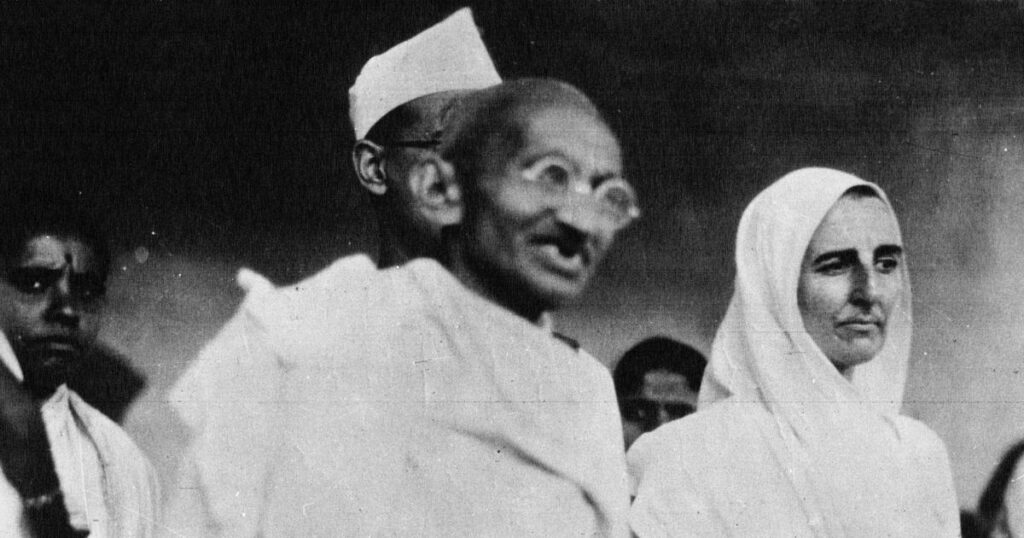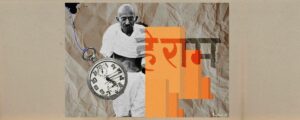In its issue dated November 30, 1947, the journal, Harijan, printed an appeal from an Englishwoman-turned-Indian to the citizens of a country she had made her own. “Twenty two years ago I, a lost wanderer,” she wrote, “refound my spirit’s home in India – India, whose aeons of history were again repeating themselves in epics of spiritual grandeur. With what boundless inspiration and enthusiasm I plunged into the great drama of Light and Hope, unfolding itself before the war-torn, sinking world. In Bapu I found the Guiding Star; in Hinduism, the word of Truth; in India, the Mother.” Then she added: “Little did I know that twenty-two years later I should have to see the Mother’s breasts torn and bleeding with the gashes inflicted by her own children, and the word of Truth trampled underfoot by the very people who call themselves Hindus.”
This anguished Indian was Mira Behn, the daughter of a British admiral who had come to this country in November 1925 to work with and alongside Gandhi. She had lived with her ‘Bapu’ in his Sabarmati and Sevagram ashrams, made speaking tours in the United Kingdom and the United States of America canvassing for India’s freedom, and spent several long terms in prison in her adopted country’s cause. All this while she had committed herself, in theory and in practice, to the Gandhian ideals of the abolition of untouchability, the promotion of khaadi, and the pursuit of Hindu-Muslim harmony.
The appeal written by Mira was addressed specifically to the last of these ideals. For the Partition of the subcontinent had been preceded and followed by a series of bloody riots in which Hindus, Muslims and Sikhs were all victims as well as perpetrators. Mira’s mentor, Gandhi, was working heroically to stem the violence. In September, after achieving success in calming Calcutta, he proceeded to Delhi where the situation was alarming, with Hindu and Sikh refugees from Partition seeking revenge against the Muslims who still lived in Delhi.
Gandhi’s hope was that after he was able to restore the security of the Muslim minority in North India, he would cross over the border and work to ensure the safety of the Hindus and Sikhs who still remained in Pakistan.
However, the restoration of peace in Delhi and its surroundings proved much harder than Gandhi had anticipated. Already angry, the Hindu and Sikh refugees had their feelings further inflamed by extremist organisations like the Hindu Mahasabha and the Rashtriya Swayamsevak Sangh, which were actively engaged in fomenting hatred against the Muslims who had chosen to stay behind in India.
A Delhi police report dated October 24, 1947 had this to say about the designs of the RSS: “According to the Sangh volunteers, the Muslims would quit India only when another movement for their total extermination similar to the one which was started in Delhi sometime back would take place… They were waiting for the departure of Mahatma Gandhi from Delhi as they believed that so long as the Mahatma was in Delhi, they would not be able to precipitate their designs into action.”
And an Intelligence Bureau report dated November 15, 1947 observed: “[T]he workers of the Rashtriya Swayam Sewak Sangh, especially those coming from West Punjab as refugees, intend starting communal trouble in Delhi after the Diwali festival. They say they could not tolerate the sight of Muslims moving about in Delhi…”
‘The dark abyss’
Mira was living in Delhi through the months of October and November 1947, watching with horror as this hate-filled ideology was taking root in the minds of more and more Hindus. Moved to act, she issued her appeal to Indians in general and to Hindus in particular. “Is it for this that we have taken our Freedom?” she asked: “Not to be the Land of Light, but to be the Land of Darkness?”
What was the end game of these religious fundamentalists calling themselves ‘Hindus’? What was the sort of country they would create if they triumphed? The India that Hindu extremists dreamed of, wrote Mira, “would be peopled by a race of self-styled, Superior Beings, whose spiritual intolerance would be the very negation of true Hinduism. All Muslims would be ruthlessly uprooted from their ancestral homes and driven out, and in this state of affairs it would be surprising if the other non-Hindus did not share the same fate.”
Mira ended her appeal with this stirring paragraph, which I must quote in full: “But my heart and mind refuse to accept this repulsive picture as inevitable. The Hindu nature will first regain its balance, and realise that it has been led into the darkness by a fanatical group of people who have become poisoned by the very thing they detest. It is no remedy for an evil to try and outdo it in its own line. The public must call a halt and think for themselves what is happening to them. Under the influence of fanatical propaganda they are blindly reviling the great leaders who brought them out of the Slough of Despond on to the dizzy heights of Freedom. If they heed not those men today, they will slip over the precipice into the dark abyss.”
Lessons from the past
Mira’s appeal to her fellow Indians was published in the last weeks of 1947. As I write this column, seventy-five years later, her appeal seems strikingly relevant to the country we now live in. Her statement about “the word of Truth trampled underfoot by the very people who call themselves Hindus” applies, word for word, to the activities of the BJP’s IT cell. Her description of the imaginary Hindutva nation as “peopled by a race of self-styled, Superior Beings, whose spiritual intolerance would be the very negation of true Hinduism” perfectly describes the ideology of the party in power in India today.
In the immediate aftermath of Partition, Hindutva ideologues wished that “all Muslims would be ruthlessly uprooted from their ancestral homes and driven out” to Pakistan; now, they have modified that ambition to ensuring that Muslims who are Indian citizens must acknowledge their theological, cultural, political, and social subordination to Hindus.
Can the Hindu mind regain its balance, shed its belief in its religious and political supremacy, and truly embrace the secular and pluralistic ideals of the freedom struggle? Back in the winter of 1947-48, it was able to do so for two reasons; first, a fast by Gandhi, where the extraordinary moral and physical courage of a seventy-eight-year-old man shamed the citizens of Delhi into a vow of communal amity; and second, the assassination of Gandhi, which shamed Hindus everywhere into shunning organisations such as the RSS and the Mahasabha, in whose crucible the killers of the Mahatma had been raised.
Apart from shaming ordinary Hindus, Gandhi’s assassination had the further, and vital, consequence of bringing Jawaharlal Nehru and Vallabhbhai Patel back together. The prime minister and the home minister had been on testy terms in the months following Independence; however, following the murder of their mutual Master, they nobly chose to bury their differences. Much as BJP propagandists may try, they cannot efface the historical truth that in those crucial years, 1948 to 1950, Nehru and Patel were comrades, not rivals, working shoulder-to-shoulder in uniting a nation from its fragments and building an institutional template for its democratic future.
Gandhi’s fast, Gandhi’s murder, and the coming together of Nehru and Patel all played their part in vanquishing the forces of Hindutva in those first, fraught years of Indian independence. Are there any lessons from that distant past for our contentious present?
In 1947-’48, Hindutva was an insurgent force, attacking the State from the outside; now, it commands the very levers of State power, and is seeking to bend every institution (including the judiciary and the military) to its will. What combination of crises, catastrophes and visionary leadership will it take for Hindutva to be dislodged from power? Or could it be that the Hindu mind shall never regain its balance, condemning us all to a divisive and destructive future? On how those questions shall be answered in the months and years ahead the future of our Republic may depend.
(Ramachandra Guha is an Indian historian and writer. Courtesy: The Telegraph.)




